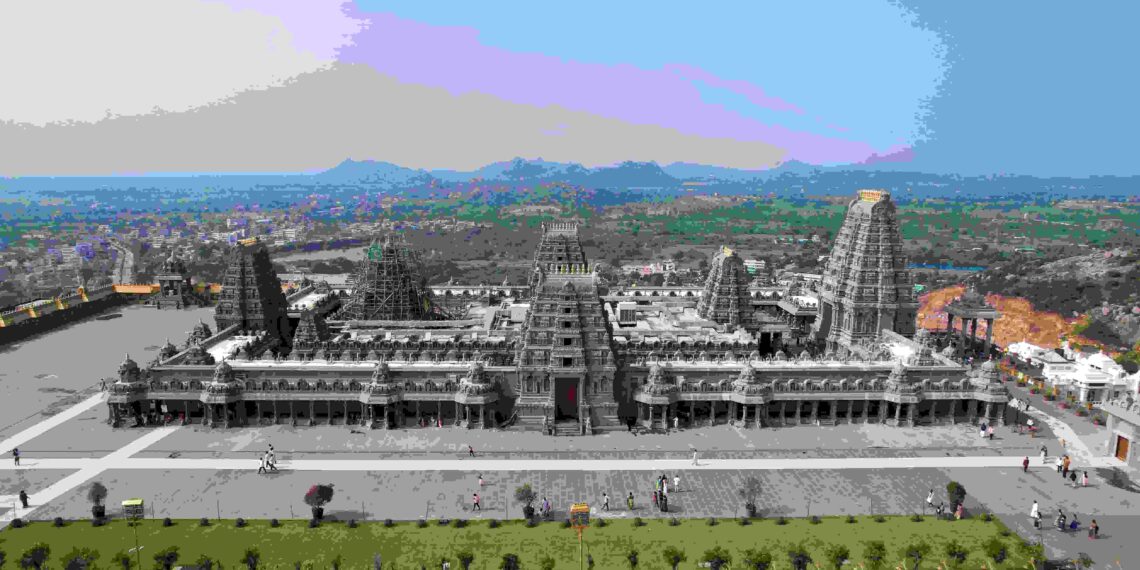The Yadagirigutta Narasimha Temple, perched atop a hill in Yadadri, Telangana, is a famous Hindu temple dedicated to Lord Narasimha, the fierce man-lion avatar of Lord Vishnu. Nestled amidst rocky hills, it’s a spiritual powerhouse drawing devotees seeking protection and blessings from the deity.
Historical Overview
The temple’s roots stretch back to the 12th century CE, during the Kakatiya dynasty’s reign, though local tales hint at older origins. Yadadri, a quiet town 60 km from Hyderabad, was a sacred spot. Old texts and village talk credit a sage, Yadava, with founding the temple after meditating in a cave where Narasimha appeared. The Kakatiyas, devout Vishnu worshippers, built the shrine.
Tughlaq raids harmed the region and destroyed the temple in the 1300s, but locals hid the Narasimha idol in a forest cave. The temple was rebuilt in the 1700s with aid from local rulers. In 2016, the Telangana government revamped it, adding grand structures while keeping its old charm. Today, it stands as a testament to faith and resilience, pulling pilgrims from across India.
Mythological Importance
The temple is for Lord Narasimha, believed to shield and protect devotees from evil and grant courage. His idol, carved from black stone, shows him in a fierce form with Lakshmi, symbolizing protection and grace. Called Yadadri Narasimha, he’s seen as a swift answerer of prayers. A local myth tells of Yadava, a sage seeking Narasimha’s vision. The deity appeared in a cave, promising to stay and bless those who pray here. Another tale links the site to the Bhagavata Purana, claiming Narasimha rested here after slaying Hiranyakashipu.
Temple Structure and Design
The Yadagirigutta Narasimha Temple in Yadadri, Telangana, is built in a South Indian Dravidian style with clear Kakatiya touches, blending faith with the hill’s rough beauty. The gopuram, fixed up in 2016, stands tall with stone carvings of Lord Narasimha, Vishnu, and dancing figures, plus flowers and lions. It’s painted ochre and white, topped with a shiny kalasa. The sanctum has a black-stone Narasimha idol with Lakshmi, wrapped in gold cloth and flowers, under a gold-painted vimana that looks holy. Small shrines for Ganesha, Anjaneya, and Garuda, made of local granite, have simple idols in open shelters, adding to the prayer space.
The temple sits on Yadagirigutta hill, reached by 300 worn granite steps leading to a cave shrine, a natural rock spot where Sage Yadava prayed. The cave’s rough walls, lit by oil lamps, hold a smaller Narasimha idol, feeling sacred. The courtyard, with black granite floors, has pillars with old Kakatiya writings, holding up a shade roof for walking around the sanctum. A small tank with lotus carvings is for ritual dips, filled by a hill spring. The temple’s stone walls, like a fort, have spots for snake gods to guard it. Carvings show Narasimha’s stories, like fighting the demon. Peepal and neem trees grow among big rocks, some with old marks, giving a wild, holy feel. The 2016 fixes added better paths but kept the temple’s raw, old heart, making it a special place for worship.
Rituals and Festivals
Narasimha Jayanti in April or May is the grandest festival celebrated in the temple premises, marking the deity’s birth, with Kalyanotsavam (wedding ritual) and procession. Brahmotsavam in February or March has homams (fire rituals) and chariot processions. Deepavali in October or November sees lamp-lighting rituals. Daily worship covers Suprabhata Seva (morning prayers), Archana (offerings), and Deeparadhana (lamp ritual). Services like Abhishekam and Narasimha Homa can be booked at the temple office. A prasad stall gives free sesame laddus for devotees. A special ritual, Sankalpa Puja, lets folks pray for protection before offerings, thought to call Narasimha’s help. Tulasi Archana, giving basil leaves on Wednesdays, is for courage.
Information for Travelers
Hours and Entry: Open daily, 4:00 AM to 9:00 PM. Entry is free, but rituals cost a bit.
Clothing: Wear simple clothes. Men doing rituals wear dhotis and go bare-chested, as is custom.
How to Get There:
Air: Hyderabad’s Rajiv Gandhi Airport, 70 km away, is nearest. Buses or taxis hit Yadadri.
Train: Bhongir Railway Station, 15 km off, links to Hyderabad and big towns.
Road: Yadadri’s 60 km from Hyderabad. Buses go often from Hyderabad’s Jubilee Bus Station.
Places to Stay: Yadadri has plain guesthouses. Hyderabad, 60 km away, has budget hotels. Stalls by the temple sell dosa, idli, and tea.
Best Time to Visit: October to March has good weather. Weekdays are calm. Godavari Pushkaralu, every 12 years, packs crowds—next in 2027.
Historical and Cultural Details
The temple on Yadagirigutta hill has mentions in the Bhagavata Purana. Kakatiya kings helped early shrines, per 12th-century marks. Archeological excavations near Yadadri found 1,000-year-old tools, showing a lively town. The cave shrine might align with Vedic star patterns, hinting at ancient wisdom.
Sahasra Namarchana is a rare custom of chanting Narasimha’s names on Saturdays for grace and protection. Swathi Nakshatram, a star-day ritual monthly, is performed for the devotees. Locals say climbing the hill at Pushkaralu washes sins, drawing thousands every year.











